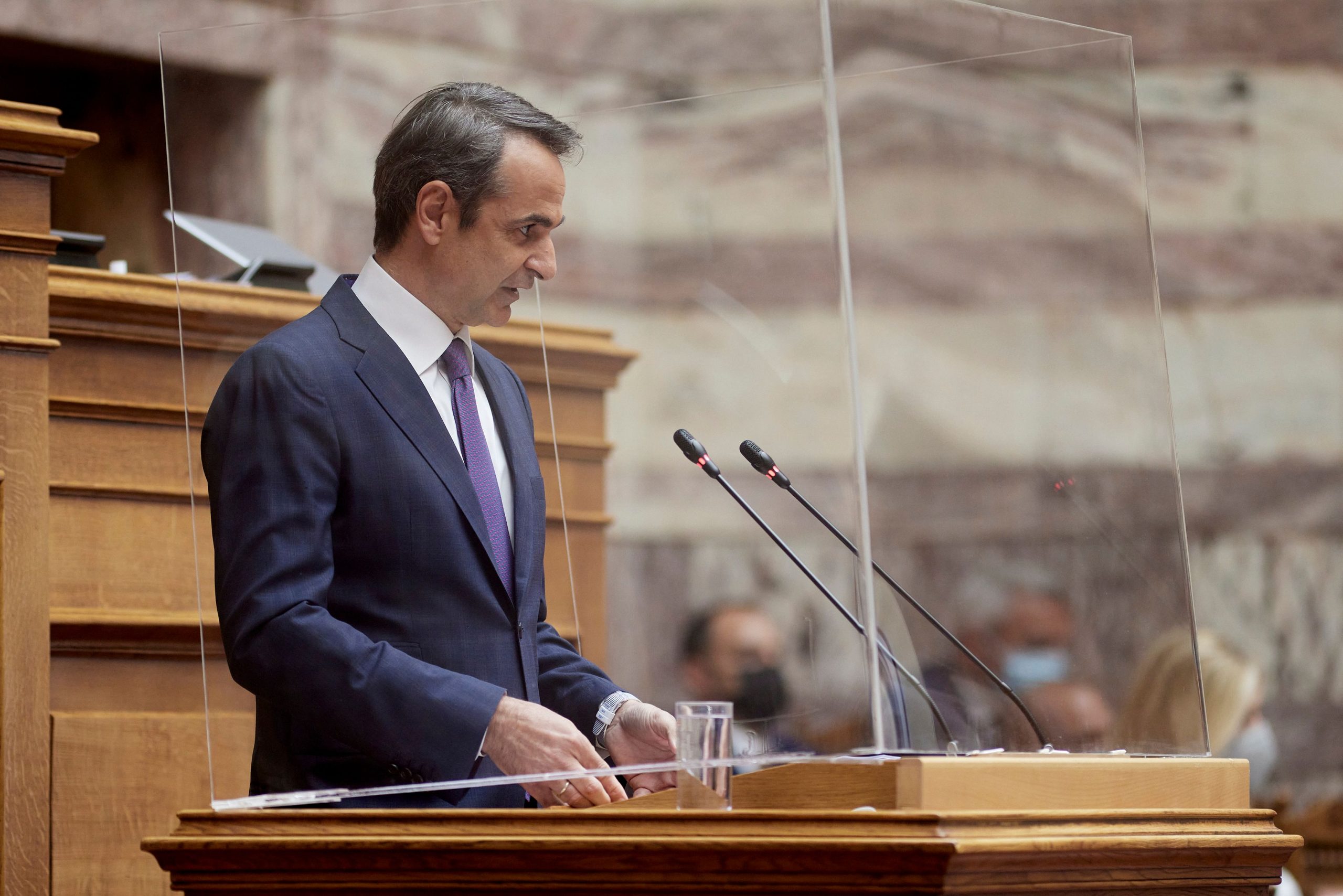
Prime Minister Kyriakos Mitsotakis said on Wednesday in parliament that the current labour law makes no provision for the changes that “come from tomorrow”, such as teleworking, but also the problems of the present, such as the role of both parents in raising their children.
He also referred to strikes, saying that every person, both workers and non-workers, may have their life disrupted by strikes, which, even though they are judged illegal, are ultimately carried out by a few to the detriment of many. That is why the new law comes to change the situation that exists after 1982.
Those who challenge the bill, the prime minister added, showed themselves to be supporters of conservativeness and stagnation, as the new bill “builds a modern work environment in our country.”
“Ten bold changes are included in this bill,” Mitsotakis stressed and added: “Changes that will finally help the Greek economy and society to meet the fast pace of the rest of Europe, as well as of our times.”
“The first change is the digital employment card… which will simultaneously combat both undeclared work and contribution evasion. This is a standing demand of the General Confederation of Employees of Greece (GSEE) and was, in fact, implemented on a pilot basis by the PASOK party but will now be implemented universally,” he pointed out.
“The new bill introduces, for the first time, a 14-day paid paternity leave,” the prime minister added, referring to the provisions of the bill for families. “Even longer than the 10 days given under European legislation,” he said, adding: “The new father will be protected from dismissal for six months. It is also forbidden to dismiss a pregnant or new mother.”
Referring to the regulations introduced by the new bill in labour issues, the prime minister noted that teleworking will be accompanied by the right to disconnect from the network when the working day is done. “The employer will not be permitted to occupy the employee after working hours. There are also technical details that will make this a reality. From now on, the companies that operate on Sunday in the rest of Europe, especially in Mediterranean countries, will also operate in Greece. Their salary will be increased by 75 percent and there will be an extra day of rest the following week.”
Mitsotakis also referred to the provisions of the bill regarding strikes: “The public interest is the general interest. Under the new framework, when a strike is rejected by the courts, it will not be able to ‘get back in through a window’ through another decision by a secondary-level union. In short, the strike is separated from the illegality. Moreover, in public utilities there will be a skeleton staff,” he added.
The prime minister then commented on the various things being said about the bill, describing them as fake news: “Because a number of myths were circulated as well as a great deal of populism, I will respond with a few words to the fake news that was heard,” he said and added: “Myth one: that the eight-hour work day is being abolished. Anyone claiming this is abolishing the Greek language as well as the social and political logic, since its protection is explicitly stated in Article 55 and can only become a reality if a state leaves Europe.”
“The perception of this bill is based on the triptych, entrepreneurial flexibility, protection and motivation of the employee and the guarantee of the State,” Mitsotakis said and explained that “the protection of the employee is our main concern and we add six more reasons for prohibition of dismissal.”
Referring to trade unionism, the prime minister said: “We want trade unionism to be a pillar of democracy, while others want a feudal party. From now on, trade unionists will have the necessary facilities, but not immunity. Let’s agree on the basics, the trade unionists exist for the workers and not the workers for the trade unionists,” the prime minister pointed out.
Latest News

Cost of Living: Why Greece’s 3% Inflation Is Raising Alarm
Greece appears to be in a more difficult position when it comes to price hikes, just as we enter the era of Trump’s tariffs.

Fitch Ratings Upgrades the Four Greek Systemic Banks
NBG’s upgrade reflects the bank’s ongoing improvements in its credit profile, Fitch notes in its report, including strong profitability, a reduction in non-performing exposures (NPEs), and lower credit losses

Trump to Announce Sweeping New Tariffs Wednesday, Global Retaliation Expected
With Trump's announcement just hours away, markets, businesses, and foreign governments are bracing for the fallout of one of the most aggressive shifts in U.S. trade policy in decades.

Inflation in Greece at 3.1% in March, Eurostat Reports
Average inflation in the eurozone settled at 2.2%, compared to 2.3% in February

Greece’s Unemployment Rate Drops to 8.6% in February
Despite the overall decline, unemployment remains higher among women and young people.

Jerry Kalogiratos Highlights Key Role of Energy Transition and Data Demand in LNG Outlook
Energy transition and the prospects of LNG were discussed at Capital Link’s 19th Annual International Maritime Forum, during a panel discussion with Jerry Kalogiratos (Capital Clean Energy Carriers Corp.)

Santorini Safe and Ready for a Dynamic Tourism Season
Authenticity, cultural heritage, and genuine experiences at the center of Santorini's new promotional campaign

Electricity Bills: Greece Announces Reduced Tariffs Schedule
Greece will now offer lower electricity rates between 11:00-15:00 and 02:00-04:00

Chevron Confirms Eyeing Natural Gas Exploration South of Crete
Chevron recently declared its intent to explore a third area, south of the Peloponnese.

Evangelos Marinakis: A time of change from which shipping can benefit
Speaking at the 19th Annual Capital Link International Shipping Forum Evangelos Marinakis stressed the challenges that shipping faces today












![Τουρκία: Μεγάλες βλέψεις για παραγωγή ηλεκτρικών οχημάτων [γράφημα]](https://www.ot.gr/wp-content/uploads/2025/03/ot_turkish_autos-90x90.png)











![ΕΛΣΤΑΤ: Αυξήθηκε η οικοδομική δραστηριότητα κατά 15,6% το Δεκέμβριο [πίνακες]](https://www.ot.gr/wp-content/uploads/2025/03/DSC9655-2-1024x569-1-90x90.jpg)

















 Αριθμός Πιστοποίησης
Αριθμός Πιστοποίησης